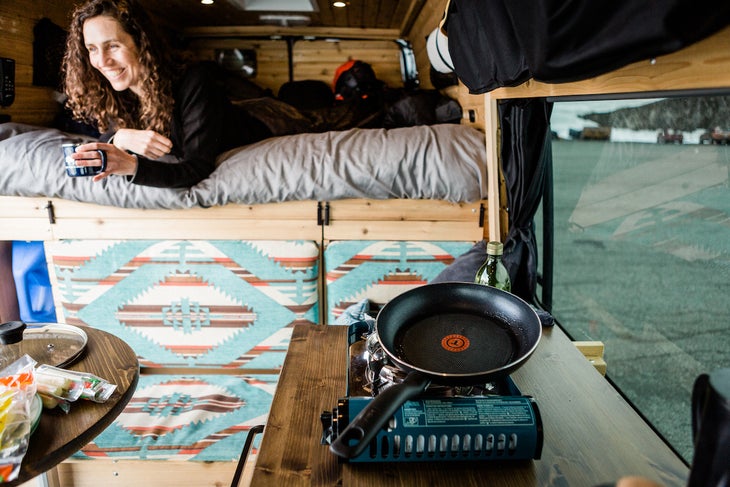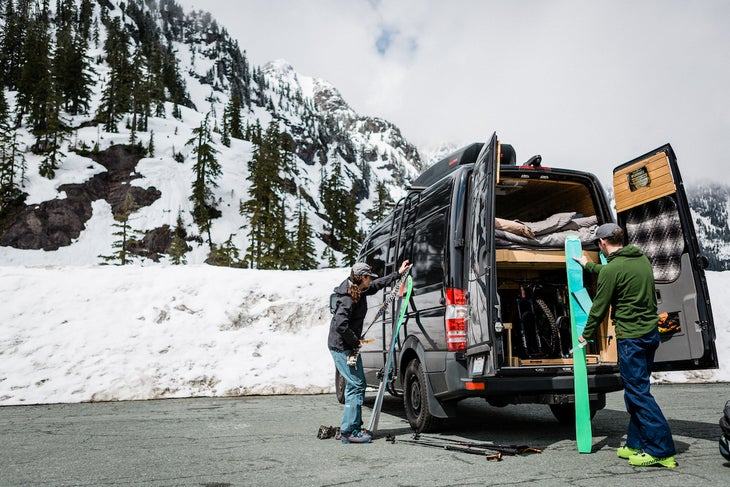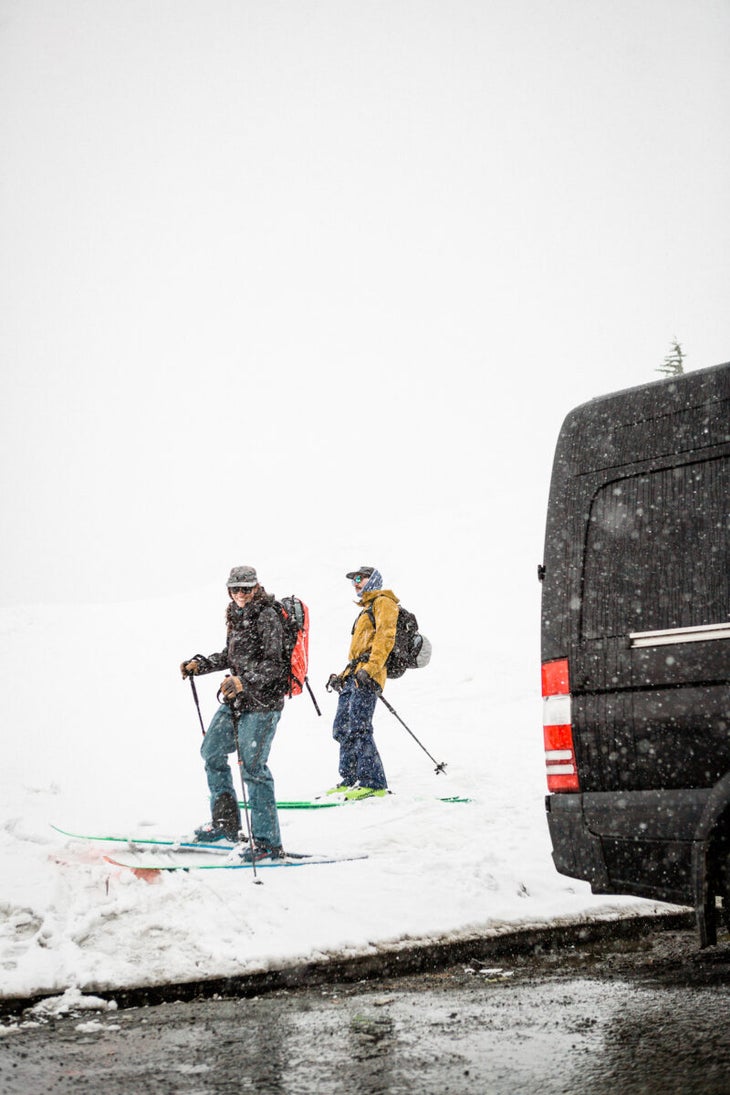Products You May Like
Spring, central Oregon, you should have seen us. Eight days into a 10-day trip, our first with a new battery installed in the van, making our way down the ridge of the Cascades. It had been, perhaps, a little too perfect. A little too on the nose. Elder Millennials set off for a van trip, skiing through the photogenic parking lots of the Pacific Northwest—the encapsulation of a specific kind of outdoor privilege.
We knew how good we had it. We’d gleefully gone on moonlit skins straight from the van with local craft brews tucked into our bibs. We high-fived each other after we’d each taken Zoom calls in our skis boots, work clients none the wiser, or jealous if they were. We’d made avocado toast each morning. And I’m sorry I’m not sorry that it was delicious.

It was all beautiful until it wasn’t. And it was his birthday. And, thanks to a faulty battery isolator—who knew that was a thing? not I—that new battery failed us. And one of us (who knows which one, really) may or may not have missed the toilet and peed on the floor that morning.
But let’s back up a bit, before bodily functions got the best of us, and before our high-minded hubris started to crumble.
My boyfriend Thomas bought the van before I met him, and basically set it up as an insulated bachelor gear garage on wheels: Ski and bike storage in the back, a cooler for a table, and a bed barely long enough for one. I’d been unconvinced about the quote unquote van life. It seemed fussy and too much. My hatchback and zero-degree sleeping bag were fine, I argued. I remain skeptical of anything that’s considered an Instagram movement, but I changed my tune about the van after the first night I slept warm in a ski area parking lot. And during the pandemic, especially the first summer, when any kind of social exposure felt fraught, the van gave us both security and the freedom to roam.
Related: The best winter camping setups for skiers
In lockdown, Thomas went into project mode on the van, building a kitchen, extending the bed, installing batteries, and an Espar heater. We took it on overnights as its transformation progressed, sitting on a half-built bench and picking sawdust out of the pillowcases. We built a table for cribbage and bought an electric kettle to use once the batteries were hooked up. We hung hooks where the heater would blow for soggy ski gear. Those batteries were the last step, the crowning glory. When it was finished, we decided to take it for a shakeout voyage. Ten days down to Mt. Bachelor, his favorite place to be, for T’s birthday.

We planned the trip from home. One of us (definitely not me) built a color-coded spreadsheet of destinations and dates: which resort lots we could camp in, which places needed parking reservations , and where we had to book our ski days in advance, because of Covid restrictions. For the first time in a long time, it felt like the good parts of traveling were coming back: planning, exploring new places, and that vacation-y feeling of being laser-focused on what’s happening around you.
A friend in Bend joked that there was a “vandemic” along with the pandemic, because so many more vehicles were coming through, and we were unabashedly part of it. By the time we rolled into the Mt. Bachelor lot and parked in the lineup of vans and campers, we were a little bedraggled, antsy, and working out the kinks of living in a small space for more than a few days. The thing they don’t tell you about living in a vehicle in the winter—even if it’s just for a short period—is that problem solving can lead to more problems or at least more stuff to jack with. Ice builds up and busts leaks. Farts get trapped. When your house gets stuck in a snowbank, you can’t just leave it there.
Take, for instance, the problem of having to go to the bathroom at night when you’re sleeping in a van right next to a bunch of other vans. Your options are a long cold walk or finding a way to pee in the privacy of your vehicle. In a hardware store in Sun River, we bought a jug that we thought was big enough for us both to use. Which I believe is the dictionary definition of romance.
“Did you pee on the floor last night?” he asked the next morning, as he got up to make coffee.
“How dare you!” “I would never!” “I am a grown-up lady person!” I yelled from my haughty perch under the covers. “So why are my socks wet?” he countered.
I refrained from lashing out at him for the privilege of having a penis. It was his birthday after all, and we had skiing to do. From the Bachelor lot, we skinned up the Cinder Cone for sunrise, ate yet another round of avo toast, and slashed springy groomers all day. We made lunch tacos back at the van. As the lifts shut down, we headed across the street for a sunset skin up Tumalo Mountain, the popular backcountry ski route on the other side of Cascade Lakes Highway. We were alone on the summit, crunching Skittles, as the sun dipped low. Light flared across the Three Sisters and I got that extra lucky feeling of being in exactly the right place, like things were coming together just the way they should.

By the time we skinned back to the parking lot dusk was setting in. We were severely under-snacked and hitting a wall. I promised a fancy birthday van dinner of tortellini and wine. Which I believe is the other half of the dictionary definition of romance.
I went to hit the lights and they flickered. And then flickered again. And then went dark.
The new batteries were supposed to charge every time we ran the engine, but—as we eventually figured out—they hadn’t been installed correctly. Every time we boiled water or charged our phones we were draining them down. Those smug Zoom calls didn’t help.
They bottomed out that night, right when we were bottoming out too. We were cold and hungry, still in our slightly sweaty layers, my pee probably frozen on the floor. That sparkly summit feeling faded fast.
It was no one’s fault exactly, and nothing was ruined except for our expectations, but it took some vigorous swearing and some poorly lobbed blames before we figured it out. The karmic curve sunk low.
I felt bad, he felt bad for feeling bad. Did I mention that it was his birthday? And that he’s one of those people who say they don’t like birthdays but whose love languages are both acts of service and gifts?
But there was wine. And a gas stove to boil pasta. And a pile of blankets on the bed.
We made food with our headlamps on, chugging the wine while we did. We probably needed to go to bed early anyway. We curled under the covers, shivering our bodies to warm the bed up. “Just don’t pee on the floor again, please,” T whispered and dissolved into giggles.
The next day we drove down into town to stay with the friends who had smack-talked the vandemic. We slept in their spare room; their shower felt great.
Being part of the vandemic, like a lot of good things—like anything probably—is far from perfect. From the outside, you only see the shiny photogenic bits of summit selfies and commute-free first chairs. You don’t see the shivering underbelly of cold fingers, broken pieces, or last nerves. Part of living on the road is that you have to learn and change on the fly. Things will go wrong, but you have to avoid catastrophizing, even when you’re hungry and cold. If you want the flexibility of living in a vehicle with someone, you have to give them grace when they do stuff that’s gross and weird.
But here’s what a van can do for you in exchange: let you wake up walking distance from the mountain, teach you to be kind in awkward situations, and remind you to be careful where you pee.
What it can’t do: teach you to be a mechanic or change your life.
The next morning, we drove north, making our way home. Like any Type Two adventure, the tension was already dissipating. By the time the windshield defrosted, our crankiness was starting to seem funny. We were already starting to plan the next trip, maybe a longer one this time, because, more than anything, a van lets you move forward.
More from the 2023 Destination Guide
This ski area could be Canada’s next big thing—but it’s not interested
The ski town housing crisis is coming for this beloved Montana community
T-Bars aren’t a relic of the past—they’re the future
